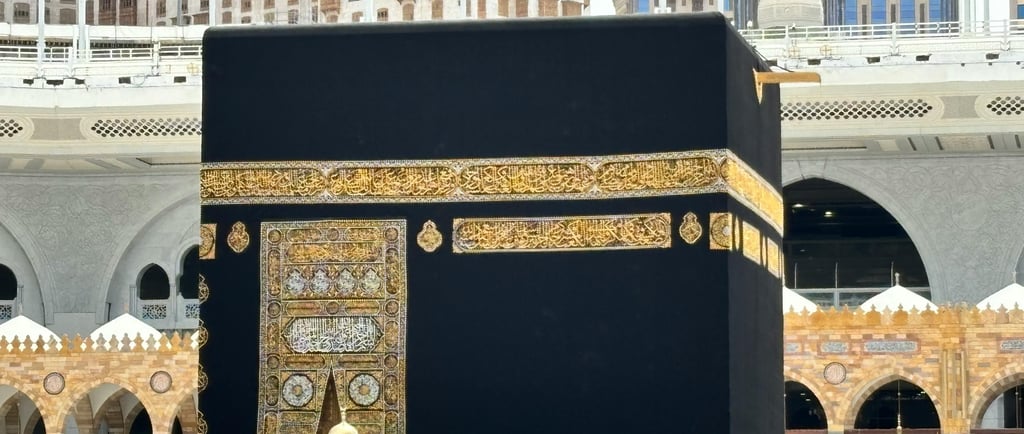The Ten Days of Dhu al-Hijjah.. the Best Days of the Year
These ten days of Dhu al-Hijjah are a precious opportunity and a great season to draw closer to Allah and earn His pleasure. So, let the Muslim hasten to seize them before it's too late
5/28/20255 min read


The journey of life passes quickly, day after day, and year after year, as if days race with nights, carrying humans to their inevitable destiny. Days are stages that a person traverses, and the fortunate one is he who seizes their goodness, invests them in obedience to Allah, and prepares for his afterlife with righteous deeds. Meanwhile, many people are heedless of these truths, neglect their duty to Allah, and wrong themselves by depriving themselves of these blessings.
Allah has made the night and the day succeed each other so that whoever misses an opportunity for a good deed in one can make up for it in the other. As Allah Almighty says: "And it is He who has made the night and the day in succession for whoever desires to remember or desires gratitude." (Quran 25:62).
It is from Allah Almighty's wisdom that He favored some days and nights over others, choosing from them blessed times as seasons for good deeds, wherein good deeds are multiplied, and sins and slips are forgiven. Among the best and most significant of these seasons are the first ten days of the month of Dhu al-Hijjah.
Virtues of the First Ten Days of Dhu al-Hijjah
Allah has distinguished these days with great virtues and unique merits, including:
1. Allah Almighty Swore by Them: Allah swore by them in His Noble Book due to their greatness, saying: "By the dawn; And [by] ten nights." (Quran 89:1-2). Interpreters, including Ibn Abbas, Ibn al-Zubayr, and Mujahid, unanimously agree that "the ten nights" refer to the first ten days of Dhu al-Hijjah.
2. The "Known Days": These are the "known days" mentioned in Allah's saying: "... and mention the name of Allah on known days..." (Quran 22:28). Ibn Abbas stated that these are the ten days of Dhu al-Hijjah.
3. They Include the Rites of Hajj: These days encompass the rituals of Hajj (pilgrimage), which is one of the best deeds and greatest in reward. As narrated by Abu Hurairah (may Allah be pleased with him) in an agreed-upon Hadith: "The Messenger of Allah (PBUH) was asked, 'Which deed is most beloved to Allah?' He said, 'Belief in Allah and His Messenger.' He was asked, 'Then what?' He said, 'Jihad in the cause of Allah.' He was asked, 'Then what?' He said, 'An accepted Hajj (Hajj Mabrur).'"
4. The Day of Arafah: This is the ninth day of Dhu al-Hijjah, a day of forgiveness and freedom from the Hellfire, on which Allah boasts to His angels about the people standing at Arafah. Fasting this day (for non-pilgrims) expiates the sins of two years.
5. The Day of Sacrifice (Yawm an-Nahr / The Day of the Greater Hajj): This is the tenth day, the best day of the year and the most sacred in the sight of Allah. Ibn al-Qayyim said: "The best of days in the sight of Allah is the Day of Sacrifice, which is the Day of the Greater Hajj."
6. The Days of Mina (Ayyam at-Tashreeq): These are the days following the Day of Sacrifice, the days of stoning the Jamarat. They are days of eating, drinking, and remembering Allah Almighty, and are considered a festival for Muslims.
7. The Gathering of the "Mothers of Worship": Imam Ibn Hajar al-Asqalani believes that the reason for the superiority of the ten days of Dhu al-Hijjah is that they combine the main acts of worship: prayer, fasting, charity, and Hajj, which does not occur at any other time. Some scholars have favored the daytime of these ten days over the daytime of the last ten days of Ramadan, while the nights of the last ten days of Ramadan are considered better than the nights of the first ten days of Dhu al-Hijjah, as detailed by Sheikh al-Islam Ibn Taymiyyah (may Allah have mercy on him).
The Merit of Righteous Deeds in the Ten Days of Dhu al-Hijjah
Righteous deeds during these days are more beloved to Allah and greater in reward than deeds at other times. Al-Bukhari narrated from Ibn Abbas (may Allah be pleased with them both) that the Prophet (PBUH) said: "There are no days in which righteous deeds are more beloved to Allah Almighty than these days," meaning the ten days. They asked, "O Messenger of Allah, not even Jihad in the cause of Allah?" He said, "Not even Jihad in the cause of Allah, except for a man who goes out with his1 person and his wealth and does not return with any of them." In another narration: "There is no deed purer in the sight of Allah nor greater in reward than a good deed done in the ten days of Adha (sacrifice)."
Recommended Acts of Worship in the Ten Days of Dhu al-Hijjah
1. Hajj (Pilgrimage): Performing the Hajj for those who are able to do so. An accepted Hajj has no reward but Paradise.
2. Fasting: It is Sunnah (recommended) to fast the first nine days of Dhu al-Hijjah, or as many of them as one can, as fasting is one of the best deeds. The Prophet (PBUH) used to fast the nine days of Dhu al-Hijjah.
3. Fasting the Day of Arafah (for non-pilgrims): Fasting this day expiates the sins of the year before it and the year after it.
4. Udhiyah (Sacrifice): This is an emphasized Sunnah on the Day of Eid and the Days of Tashreeq, reviving the tradition of Prophet Ibrahim (Abraham) and Prophet Muhammad (peace be upon them). The Sunnah is for the Muslim to slaughter it with his own hand, eat from it, and give some in charity.
5. Increasing Dhikr (Remembrance of Allah – Takbir, Tahlil, Tahmid): It is Sunnah to increase remembrance of Allah through Tasbeeh (saying "SubhanAllah"), Tahmid (saying "Alhamdulillah"), Tahlil (saying "La ilaha illAllah"), and Takbir (saying "Allahu Akbar"). It is recommended for men to say the Takbir aloud in mosques, markets, and homes, to manifest worship and glorify Allah. Ibn Umar and Abu Hurairah used to go out to the market during the ten days saying Takbir, and the people would say Takbir with them.
o Prescribed formulas for Takbir:
§ "Allahu Akbar, Allahu Akbar, Allahu Akbar Kabeera." (Allah is a Great, Allah is Great, Allah is Most Great.)
§ "Allahu Akbar, Allahu Akbar, La ilaha illAllah, Wallahu Akbar, Allahu Akbar, Wa lillahil Hamd." (Allah is Great, Allah is Great, there is no god but Allah. Allah is Great, Allah is Great, and2 to Allah belongs all praise.)3
§ "Allahu Akbar, Allahu Akbar, Allahu Akbar, La ilaha illAllah, Wallahu Akbar, Allahu Akbar, Wa lillahil Hamd." (This is the formula of Ibn Mas'ud, may Allah be pleased with him).
6. Specific Takbir after Prayers: This begins from the Fajr prayer on the Day of Arafah until the Asr prayer on the last Day of Tashreeq (the thirteenth of Dhu al-Hijjah). This is the most correct view held by the majority of the Salaf (early Muslims) and jurists.
7. Other Acts of Righteousness: Such as voluntary prayers, charity, reading the Quran, maintaining ties of kinship, being kind to people, and other good deeds. Every righteous deed during these days has a multiplied reward.
A Call to Seize the Best Days
Indeed, these ten days of Dhu al-Hijjah are a precious opportunity and a great season to draw closer to Allah and earn His pleasure. So, let the Muslim hasten to seize them before it's too late, and strive in various acts of obedience and worship, hoping to be among the successful and accepted.
We ask Allah to help us in His remembrance, His gratitude, and in worshipping Him well, and to accept our righteous deeds.
Learn
Explore the Qur'an and Islamic sciences online.
Connect
Join Our Community
info@quranandlife.net
+20 1113304698
Copyright © 2024 Quran and life
